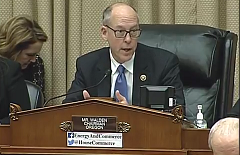Divided Subcommittee Passes Rate Reg-Blocking Bill

The smarter way to stay on top of broadcasting and cable industry. Sign up below
You are now subscribed
Your newsletter sign-up was successful
Following contentious debate over Democratic amendments ultimately defeated, the House Communications Subcommittee has favorably reported out a bill that would prevent the FCC from regulating the rates for Internet access.
That came in a markup of a trio of communications-related bills in the subcommittee Thursday (Feb. 11). The vote for the bill was 15 to 11. The breakout of the vote was not immediately available, but Republicans carried the day and the majority of Democrats opposed it.
Both sides of the aisle agree that they don't want the FCC regulating the rates consumers pay for broadband service, and Subcommittee chairman Greg Walden (R-Ore.) said he thought both sides were close to agreement on a bipartisan bill, but those negotiations broke at the 11th hour after what he said was the minority's last-minute "papering" of the process with amendments.
Ranking member Anna Eshoo (D-Calif.) resented the characterization, said they just had not been able to agree, and advised toning down the rhetoric.
Both sides also suggested there could still be a path to "yes" by the time the bill gets to full committee, though Eshoo signaled that would have to come from the majority agreeing to explicit consumer protections.
Eshoo said the sticking point in the negotiations was that they had not come up with a definition of rate regulation, which she said was crucial given the power of legislative language.
The Republican backed bill, H2666, simply states that "Notwithstanding any other provision of law, the Federal Communications Commission may not regulate the rates charged for broadband Internet access service..."
The smarter way to stay on top of broadcasting and cable industry. Sign up below
But without a definition of what that covered, the Democrats feared it covered too much and that specificity was needed.
Walden said he thought they had been working toward that definition, but suggested, for one thing, the FCC had not provided the technical assistance sought, at least to date.
“FCC legislative staff, senior policy experts and senior attorneys have been in continuous communication with both majority and minority Committee staff to provide technical and legal analysis about the potential unintended consequences of the legislation," said FCC press secretary Kim Hart.
One of the two Democratic amendments defeated, offered by Eshoo, would have codified all the Title II provisions the FCC chose to forbear as part of its reclassification of Internet access service, which the Democrats said should assuage Republican concerns about future FCC un-forbearance in service of rate regulation, or anything else.
But Walden pointed out that their concern was also that the FCC would use its authority under sections not forborne—those applying to just and reasonable rates—to achieve back-door rate regulation by weighing in on a rate after the fact, judging it wanting, and penalizing with the vengeance only a D.C. bureaucracy can muster.
The second amendment that went down to defeat, offered by Rep. Doris Matsui (D-Calif.), would have specifically carved out consumer protections by saying nothing in the act could be construed to affect the FCC's ability to regulate discriminatory or prevent unfair business practices, regulate billing practices (as distinguished from prices, presumably), affect Universal Service Fund subsidies, enforce its new Open Internet rules or affect its merger review authority.
Walden said there were some parts of that amendment they might find common ground on, particularly universal service, but that others had issues, including the breadth of the consumer protection language.
Walden opposed both amendments, joined by his Republican colleagues.
Contributing editor John Eggerton has been an editor and/or writer on media regulation, legislation and policy for over four decades, including covering the FCC, FTC, Congress, the major media trade associations, and the federal courts. In addition to Multichannel News and Broadcasting + Cable, his work has appeared in Radio World, TV Technology, TV Fax, This Week in Consumer Electronics, Variety and the Encyclopedia Britannica.

